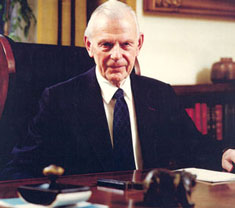A Danish internationalist
Bengt Strömgren inherited his father's international vision and worked for many years in a number of international organisations. He overtook Einstein's office at Princeton, where he helped to define NASA's space exploration programme and he played an important role as an ambassador for Denmark and made great contributions to research policy, including as president for the European Southern Observatory, ESO.
Internationalism handed down
Following World War I, Elis Strömgren was nominated for the Nobel Peace Prize three times thanks to his tireless efforts to strengthen international relations and international scientific communication. He was never awarded the prize though.
The son, Bengt Strömgren, inherited his father's international vision and his contributions to the internationalization of astronomy were significant - and with his diplomatic manner he was often used as a negotiator.
Overtook Einstein´s office at Princeton
In 1957 Bengt Strömgren left his position as the director of the Yerkes Observatory in favour of a prestigious professorship at the Institute of Advanced Study at Princeton, where he took over an office previously used by Albert Einstein, who died in 1955.
Bengt Strömgren had until then also held a formal professorship at the University of Copenhagen which also ended that year. With that he left, in reality, Danish astronomy for a long period. At Princeton Bengt was part of the effort to define the NASA space exploration program.
The Carlsberg Honorary Residence after Bohr
As the first astrophysics professor at Princeton he worked productively for ten years, after which he and his family chose to move home to Denmark.
The family took over the Carlsberg Honorary Residence - previously occupied by Niels Bohr - which became a popular place for meetings, symposiums and parties.

Many honorary offices in addition to research
Strömgren was involved in numerous projects, events and organisations, and he was awarded a number of honorary offices, including the general secretary and subsequently the president of the International Astronomical Union (1948-52 and 1970-73 respectively).
From 1969-1975 he was the president of Royal Danish Academy of Sciences and Letters during a period of transition for the academy from a traditional learned society to an academy that had to adapt to the challenges of a modern society.
He was the president of the Danish Cancer Society for ten years and from 1971-75 he was the director of NORDITA.
Astrophysics grows in NORDITA
The seed to the growth of astrophysics in NORDITA (Nordic Institute for Theoretical Physics) goes back to Bengt Strömgren's affiliation with the institute following his return to Denmark.
A series of seminars were held NBI and NORDITA, where many foreign physicists and astrophysicists were guest professors for a number of years.
Little Denmark and Big Science
With Denmark's membership in the international "Big Science" project the European Southern Observatory (ESO) from 1967 he came to play an important role as a scientific ambassador for Denmark. In his later years he made great contributions to research policy, including as president of ESO's research policy committee from 1971 and he later became president of the ESO-council. He published articles throughout his life - the last coming out just a few months before he died of a heart attack after a short illness in 1987.
